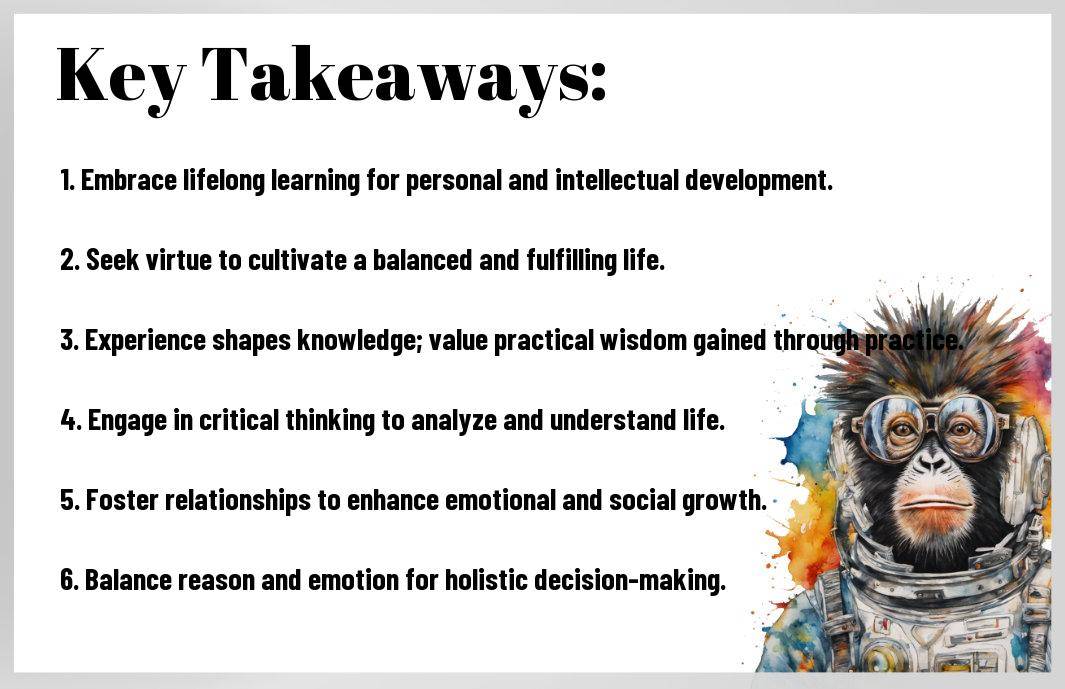With a wealth of insight that has stood the test of time, Aristotle offers us invaluable lessons on how to learn and grow in our lives. As I explore his teachings, I find that they provide practical guidance on everything from ethics to personal development. In this blog post, I’ll share some of the key philosophies that can help you on your journey to becoming the best version of yourself. Together, we can investigate into the timeless wisdom that Aristotle has to offer and apply it to our everyday experiences.
Key Takeaways:
- Virtue Ethics: Aristotle emphasizes the importance of developing moral character and virtues as the foundation for a fulfilling life.
- Golden Mean: Striving for balance and moderation in behaviors leads to a harmonious existence, avoiding extremes.
- Telos: Understanding your purpose or ultimate goal is imperative for personal growth and fulfilling your potential.
- Practical Wisdom: Aristotle advocates for phronesis, or practical wisdom, as a guiding force in making ethical decisions and navigating life’s challenges.
- Community: The significance of social relationships and community in shaping individual character and promoting mutual growth is highlighted.
- Lifelong Learning: Aristotle stresses the importance of continuous learning and self-improvement as key to personal development.
- Reflection: Regular self-reflection and contemplation are necessary for understanding oneself, one’s actions, and the path to growth.

Embracing the Golden Mean
The concept of the Golden Mean truly resonates with me as I navigate the ups and downs of life. Aristotle taught us that virtue lies in finding a balance between excess and deficiency, encouraging us to aim for moderation. For instance, when it comes to my daily habits, I try to embrace a balanced approach to things like work and leisure. Instead of overindulging in one or the other, I find that I am much happier and more productive when I strike that perfect chord in the middle. Whether it’s the time I spend on my hobbies, or even the way I handle stress, I’ve learned that moderation often leads to a more fulfilling life.
As I apply this philosophy to my decision-making, I start to see how embracing the Golden Mean can lead to meaningful growth. It invites me to reflect on my actions and to consider how I can adjust my behaviors for a better lifestyle. When I find myself leaning too far toward one extreme, I take a moment to recalibrate, ensuring I tackle every aspect of my life with balance in mind. It’s an ongoing journey, but I find that being aware of this principle helps me foster healthier relationships and develop a more profound sense of contentment. So, I encourage you to join me in this pursuit—let’s strive for that sweet spot together and see how it transforms our lives!

The Importance of Friendship
There’s something incredibly enriching about the friendships we foster throughout our lives. When I reflect on my relationships, I’m reminded of how Aristotle placed great value on friendship, considering it necessary for a fulfilling life. It’s not just about companionship; these bonds offer us support, laughter, and different perspectives that challenge us to grow. I find that my closest friends encourage me to reflect on my own thoughts and beliefs, helping me to expand my understanding of the world around me.
As I navigate the ebbs and flows of life, I’ve realized that friendship brings a sense of stability and joy. When I share my dreams and fears with friends, I allow myself to be vulnerable, which strengthens our connections. In these moments, I appreciate the wisdom, laughter, and occasional debates, knowing that each conversation helps shape who I am. So, as we explore Aristotle’s insights together, let’s not underestimate the power of friendship in our journeys of learning and growth; it’s truly one of life’s greatest treasures.

Cultivating Habits for Success
There’s something truly inspiring about the way Aristotle emphasizes the importance of habits in shaping our character and ultimately, our success. When I think about my own journey, I realize that the little choices I make every day lay the groundwork for the future I envision. By cultivating positive habits, I’m not just making small changes; I’m creating a lifestyle that promotes growth and achievement. I encourage you to reflect on the habits that serve you well and those that might be holding you back. By identifying and nurturing the productive practices, you can transform your daily routines into stepping stones toward your goals.
As I strive to adopt habits that align with my values and aspirations, I’ve found it helpful to start small. You might want to pick just one habit to focus on, allowing it to grow organically over time. For instance, if I want to improve my physical health, I could begin with a simple daily walk. This small action not only boosts my well-being but also builds momentum toward more significant changes. As I continue to reinforce these positive behaviors, I find that they become part of who I am, shaping my path to success in fascinating ways. So, what habits will you choose to cultivate in your own life? Your journey to success starts with those small, intentional steps.
Understanding Virtue and Character
Any journey into the heart of Aristotle’s philosophy invites us to explore the concepts of virtue and character. I find it fascinating that Aristotle believed virtues are not just abstract ideals but rather habits we cultivate over time. When I reflect on my own life, I can see how my actions and choices shape my character. By striving to embody virtues such as courage, honesty, and generosity in our daily interactions, we not only enrich our own lives but also positively influence those around us. It’s as if I’m sculpting my character with each thoughtful decision I make, gradually transforming myself into the person I aspire to be.
Moreover, I’ve come to appreciate Aristotle’s idea that achieving virtue requires finding balance. He advocated for the “Golden Mean,” where virtue lies between excess and deficiency. This resonates with me because it encourages mindfulness in my actions and decisions. When I approach situations, whether personal or professional, I think about finding that balanced response. Are you brave enough to stand up for what’s right without being reckless? Are you generous yet mindful of your own needs? Embracing this concept has not only helped me understand my own character better but has also provided a roadmap for personal growth that I continue to follow.
The Role of Reason in Decision Making
Clearly, when I think about the role of reason in decision-making, I realize how vital it is to navigate the choices life throws my way. Aristotle emphasized the importance of rational thought, and I’ve found that taking a step back to analyze my options allows me to make more informed decisions. It’s easy to get swept up in emotions or the opinions of others, but when I pause and engage my mind, I can weigh the pros and cons more effectively. This process not only helps me find clarity but also builds my confidence in the decisions I make.
As I apply Aristotle’s teachings on reason, I’ve discovered that it’s not just about finding the right answer but cultivating a deeper understanding of myself and my values. I invite you to embrace this practice as well. When faced with a decision, ask yourself critical questions: What do I truly want? How do my choices align with my long-term goals? By employing reason in this way, I feel empowered to create paths that resonate with my authentic self, leading me toward personal growth and fulfillment.
Exploring the Nature of Happiness
Not many people stop to think about what happiness truly means, but I find it fascinating to explore the different dimensions it encompasses. For Aristotle, happiness was not just a fleeting emotion; he saw it as a lifelong pursuit, deeply intertwined with our actions, virtues, and purpose. When I consider my own life, I realize that happiness stems from engaging in activities that bring joy and fulfillment. It’s about cultivating relationships, honing my skills, and striving for personal excellence in every aspect, which resonates so much with his philosophy.
As I reflect on my journey toward happiness, I encourage you to take a moment to assess your own sources of joy. Is it the laughter of friends, the satisfaction of achieving a goal, or perhaps the beauty of nature? Each of us experiences happiness differently, and what brings you joy may not necessarily work for someone else. By embracing the lessons from Aristotle, I can remind myself that the pursuit of happiness is a personal journey, one that is enriched by understanding my values and aspirations, ultimately guiding me toward a more fulfilled life.
Final Words
Summing up, I find that Aristotle’s wisdom offers a wonderful guide for my own learning and personal growth. His thoughts on virtue, reason, and the pursuit of excellence resonate deeply with me. They inspire me to strive for balance in my life while becoming the best version of myself. As I continue this journey, I truly believe that embracing these timeless principles can lead to profound changes not only in my character but in how I engage with the world around me.
Moreover, if you are eager to explore more about how these ideas can enrich your educational journey, I highly recommend checking out Embracing Excellence: Aristotle’s Timeless Wisdom in …. This resource provides deeper insights into applying Aristotle’s teachings in a modern context, and I am confident it can serve as a valuable tool for your own growth. Let’s keep learning and growing together with the wisdom of great thinkers like Aristotle!
FAQ
Q: What is “Learning and Growing with Aristotle’s Wisdom” all about?
A: “Learning and Growing with Aristotle’s Wisdom” is a program designed to integrate the philosophical teachings of Aristotle into modern learning practices. The aim is to encourage individuals to develop critical thinking skills, ethical reasoning, and personal growth by exploring timeless concepts that Aristotle presented in his various works, such as his thoughts on virtue, happiness, and the nature of knowledge.
Q: How can Aristotle’s teachings apply to modern education?
A: Aristotle emphasized the importance of experiential learning, observation, and dialogue. His ideas can be incorporated into modern education by fostering environments that promote discussion, hands-on experiences, and inquiry-based learning, allowing students to apply knowledge practically and reflectively in real-world situations.
Q: Are there any specific philosophies of Aristotle that participants will explore?
A: Yes, participants will explore into a variety of Aristotle’s philosophies, including the concept of virtue ethics, the theory of the golden mean, the pursuit of eudaimonia (flourishing or well-being), and his categorization of knowledge into different domains. Each of these ideas offers unique insights into personal development and ethical decision-making.
Q: Who is this program intended for?
A: This program is intended for learners of all ages—students, educators, professionals, and anyone interested in personal development. It is suitable for individuals looking to enhance their understanding of philosophical principles and applying them to their personal and professional lives.
Q: What methods are used for learning in this program?
A: The program utilizes a combination of methods, including interactive lectures, group discussions, case studies, and reflective journaling. Participants engage in collaborative learning experiences that encourage dialogue and the practical application of Aristotle’s ideas in a supportive environment.
Q: Will there be any assessments or evaluations involved?
A: While the program emphasizes learning for personal growth rather than formal assessments, participants may engage in self-reflective evaluations or group presentations to facilitate deeper understanding and articulation of Aristotle’s principles. Feedback will focus on nurturing skills and encouraging further exploration of topics.
Q: How can I get involved in this program?
A: Interested individuals can join the program by visiting the official website for registration details and upcoming sessions. Many programs offer online and in-person options to cater to different preferences. Additional resources, like reading materials and discussion forums, are provided to enrich the learning experience.



